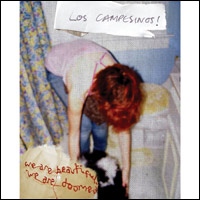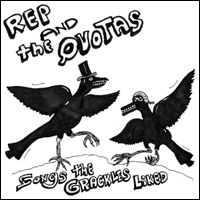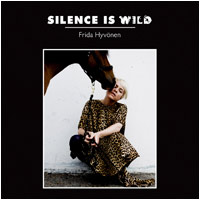
We Are Beautiful, We Are Doomed
Arts and Crafts
It’s been said by Gareth Campesino that his group’s latest album is not the product of leftovers and B-sides from this year’s Hold on Now, Youngster..., but an entirely different monster altogether, written and recorded months apart. Still, the word-crammed wit of Gareth and coquettish coo of Aleksandra atop the twee-punk joviality of their music make it hard to distinguish between the two. If anything We are Beautiful, We are Doomed is the “matured” Los Campesinos, a version of the band favoring poetic aggression and emotional heft to overtly catchy disco-pop and quirky baubles. Both records, however, are built upon the same nostalgic structure: prep-school orchestras that call to mind fellow countrymen Gorky’s Zygotic Mynci or oddball forgottens the Starlight Mints; bright slacker melodies reveling the baggy jeans of Pavement and Archers of Loaf; and the literal, tongue-twisting, lost-love whines that could come from one of many past dalliances with any band from the Kingdom that indulged in hyper-syllabic melancholy. It might even make more sense, due to youth and subject matter, to take the perspective that what they do is the more intelligent Welsh equivalent of our “emo”—a generational gap I could only endure with a thick Cardiff accent.
“Documented Minor Emotional Breakdown” does little to discourage that casting. Though slightly less propulsive, it is dripping with intimate language describing the horror of awkward coitus in great detail—the blood on your lips, the graffiti in the phonebox, the cigarettes in my pocket, training for years in hushed tones. Los Campesinos thrive on energy, sometimes displaying too much in their elaborate yet simple arrangements, similar in scope to the Arcade Fire’s kitchen-sink theatrics but rarely straying from a base of guitar-driven indie rock a la the Pixies. Only here, in grand gestures like “The End of the Asterix” or “You’ll Need Those Fingers for Crossing,” the band weaves glockenspiels, handclaps and violins into a chaotic and joyful beautiful mess, which never gets any less cute even while the song-ending swells tend to sound homogenous by the album’s final third. Despite skipping through the recent-past’s collection of indie anthems or frequently reaching a sugary saturation point, Los Campesinos seem diligent and poised to create, like the stunning “Miserabilia” (the Smiths re-imagined as gothic popsters), something that can hold it’s own amongst that lexicon, even when the themes of tortured vibrant youth remains the same.
Kevin J. Elliott

Songs the Grackles Liked ep
Columbus Discount
The crew at Columbus Discount Records continues its run of releases by Ohio heavyweights with Mike Rep and the Quotas’ Songs the Grackles Liked. The four-song EP, the first new record by Rep since 2005’s Black Hole Rock CD and the first Rep vinyl release of this decade, showcases the current Quotas line-up at its peak while highlighting the wealth of talent in the band’s native Harrisburg, Ohio.
Rep’s take on “I Was There,” originally of Tommy Jay’s Tall Tales of Trauma, adds an electric brutality to the Civil War tale. Written by Tommy Jay as a first-person account of a Confederate soldier’s death during the Battle of Fredericksburg, “I Was There” is similar to the Band’s “The Night They Drove Old Dixie Down” in the sense that both songs may have been written as a Northerner’s attempt at seeing through the eyes of the Confederacy. But where Robbie Robertson got bogged down in sentimentality, Tommy Jay masterfully produced a stark look at death and the soldier’s legacy that is given added depth by Rep’s vocal. Rounding out side one, “Time on My Hands,” a track written by the great Harrisburg singer-songwriter T.A. Lafferty, sounds like a lost ‘60s classic. If you want proof that the Quotas double as a top garage-pop band, you’ve got it here.
Rep’s epic “Lemuria” serves as the centerpiece of the EP. A sort of rock space shanty, the sprawling tale is punctuated by Johnny Furnace’s cascading lead guitar and Tommy Jay’s precise snare hits, and it represents another highlight in the Rep songbook. “I’m Going Down,” another Tommy Jay track, closes the record with a prototypical Quotas rocker.
Don’t be fooled by the relative brevity of this one (you get in and out in less than 18 minutes), Songs the Grackles Liked stands in there with the best of the Mike Rep and the Quotas catalog. 2008 has been a stellar year for CDR. This EP is a perfect way to keep the momentum going into the new year.
Ron Wadlinger

Silence Is Wild
Secretly Canadian
Swedish pop music tends to dredge up memories of ABBA for an older generation, but lately, with the help of such musical acts as Lykke Li, Peter Björn & John and Jens Lekman, Sweden is becoming a hotbed for up and coming musical talents. With piano and voice as her weapons of choice, singer-songwriter Frida Hyvönen is no exception to this explosion of young talent, and she does her best to solidify her place among these well-known Swedish acts on her latest release, Silence Is Wild.
Hyvönen’s second full-length album is a mixture of haunting piano melodies and a booming, melodic voice, reminiscent of Carly Simon, albeit without the twang. Fans of her sparse, yet kitschy debut, Until Death Comes, may be taken aback at the breadth of instruments on this album (her trademark piano is augmented by a wealth of strings and synths), but those who love her for her voice will not be disappointed. Silence is much more straightforward than her first release, and thus the lush accompaniment still allows her voice to carry many of the songs (“Dirty Dancing,” “Enemy Within”), the raw passion inherent in Hyvönen’s voice becoming evident.
The record’s only downfall comes when it veers into redundancy, the differences of the slower, introspective songs beginning to blur after a few listens. However, it still shines by highlighting Hyvöonen’s greatest quality: her voice. She mixes personal experience with narrative storytelling, and although the lyrics are relatively simple, the heartbreaking tenderness of her singing gives even the most lifeless lyric a strangely personal dimension. Ultimately, the album though quite beautiful, lacks depth and leaves one wanting more than it can give.
Jennifer Farmer
MP3: "Enemy Within"

Sunday at Devil Dirt
Fontana International/V2
Stand-up bass, circular finger-picked acoustic, simple squeeze-box accordion, strings waterlogged with reverb, clangy percussion, traditional song structures, old-timey folk—is this another entry in the unfortunately pervasive-of-late pirate grunge genre? Sunday At Devil Dirt begins at the edge of the gangplank, so near to diving in the depths of Moby Dick folk with a song called... “The Seafaring Song.” At least they’re upfront about it, right? Just as soon as the iPod was strapped to the harpoon and ready for oblivion, Mark Lanegan drags his baritone in like cannon balls and chains over the weathered wood. This may be the most heartfelt impression of Leonard Cohen ever released into the ether. And, honestly, if Cohen cannot do it anymore, then what other spotlight-shunning mystery man could? Lanegan. Yes, that Mark Lanegan, of Screaming Trees, Gutter Twins (with Greg Dulli), the only good part of Queens of the Stone Age and Soulsavers (some with Will Oldham), the one who collaborated with P.J. Harvey, Dean Ween, and Izzy and Duff on his solo record. This is his second run with Isobel Campbell, and it has proven to be a match made for keeps. While he is a prolific artist, it hasn’t all been gold, but he’s done well working with the girl from Belle and Sebastian. Here he and Campbell sound completely cohesive together, and pick up the ball right where Leonard Cohen dropped it after Death of a Ladies’ Man. His voice is what Lucifer sounded like after his first breath of brimstone: hairy, bearded, red eyed and wrapped in leather. Her voice is the vellum-shielded angel he left above, shining white beams of light down on the dusty desert ballads the band tumbles through like Russian thistle. Perhaps, for our sake, like in “Back Burner,” he promised Campbell he’ll “stick around, put it on the back burner,” because this is by far the most thoroughly listenable project Lanegan’s worked on. It is not all scallywag jamboree, there is depth here, honest feeling in the music. Deep in the record the tears start to fall and the regret sets in, then Lanegan tells us, “Don’t you cry, a man’s a man, does the best he can,” and we feel better that at least it wasn’t a pirate record.
Michael P. O’Shaughnessy
ALBUM REVIEWS
Wintersleep, Welcome to the Night Sky
Love Is All, A Hundred Things Keep Me Up At Night
The Magnificents, Year of Explorers
Times New Viking, Stay Awake EP
Skeletons, Money
Q-Tip, The Renaissance
Wild Beasts, Limbo, Panto
The Cure, 4:13 Dream
O'Death, Broken Hymns, Limbs, and Skin
Crystal Stilts, Alight of Night
Deerhunter, Microcastle
Like a Fox, Where's My Golden Arm?
Gang Gang Dance, Saint Dymphna
The Sea and Cake, Car Alarm
